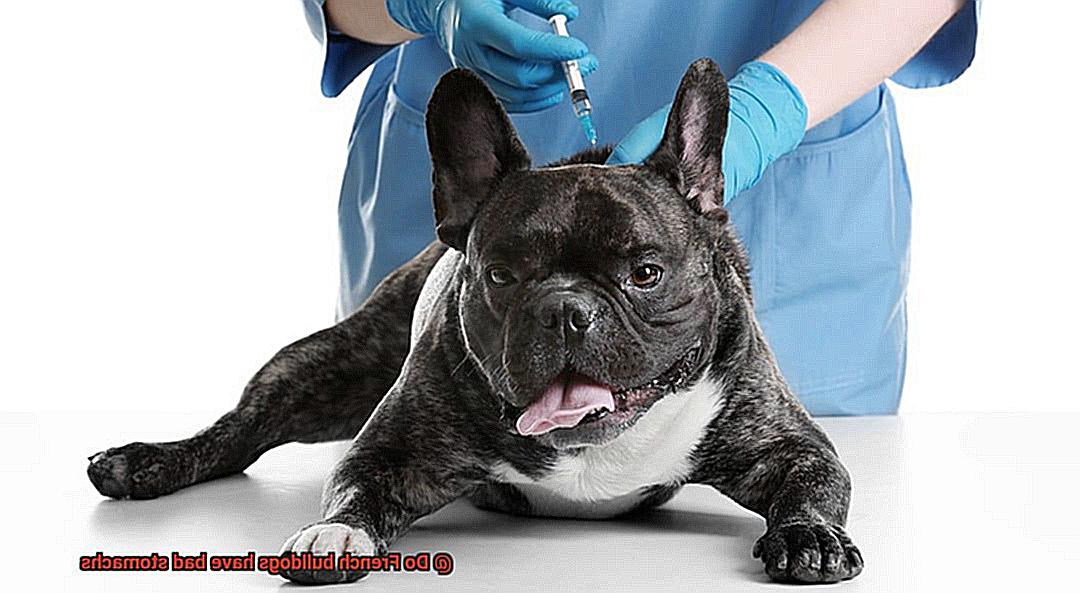Do French bulldogs have bad stomachs?
French bulldogs, those irresistibly charming bundles of joy, have captured the hearts of dog enthusiasts far and wide. But as any responsible pet parent knows, understanding their unique health quirks is key to keeping them happy and thriving. Among the swirling rumors and whispers surrounding these lovable flat-faced canines, one question stands out: do French bulldogs truly possess delicate stomachs?
As an authority in the field, it’s time to separate fact from fiction and shed light on the truth behind French bulldogs’ digestive systems.
In this all-encompassing blog post, we’ll dive deep into their intricate digestive anatomy, uncover common tummy troubles that plague Frenchies, and arm you with practical tips to ensure your furry companion’s gut stays in tip-top shape. Whether you’re considering welcoming a French bulldog into your home or already have one snuggled up by your side, this informative guide will provide you with the knowledge needed to keep their stomachs content and contented.
Do French Bulldogs Have Bad Stomachs?
Contents
- 1 Do French Bulldogs Have Bad Stomachs?
- 2 The Brachycephalic Nature of French Bulldogs
- 3 Overeating and French Bulldogs
- 4 Sensitive Stomachs in French Bulldogs
- 5 Food Allergies and Intolerances in French Bulldog
- 6 Gastroesophageal Reflux Disease (GERD) in French Bulldog
- 7 Diet Management for a Healthy Digestive System in French Bulldogs
- 8 Tips to Improve Your Dog’s Digestive Health
- 9 Conclusion
French Bulldogs are beloved for their adorable appearance and friendly personalities. However, some owners may notice that these charming canines have sensitive stomachs. In this article, we will explore the potential stomach problems that French Bulldogs may experience, why they are more prone to these issues, and how owners can help manage and prevent them.
Food Allergies and Sensitivities:
French Bulldogs are known to have food allergies or sensitivities, making them more susceptible to stomach problems. Some common allergens include grains, certain proteins, and additives found in commercial dog food. It’s important for owners to identify any potential food sensitivities through a process of elimination and provide their furry friends with a balanced diet that avoids trigger ingredients.
Brachycephalic Airway Syndrome:

The unique facial structure of French Bulldogs, with their short muzzles and compact skulls, can contribute to a condition known as brachycephalic airway syndrome. This can affect their breathing, causing them to swallow excess air while eating or drinking. The resulting bloating and discomfort can lead to digestive issues. Feeding French Bulldogs smaller meals and ensuring they have access to fresh water can help alleviate this problem.
Gastroenteritis:
Gastroenteritis, inflammation of the stomach and intestines, is another common stomach problem in French Bulldogs. This condition can be caused by various factors such as dietary indiscretion, bacterial or viral infections, or even stress. Owners should monitor their dogs’ diet, avoid giving them table scraps or foods that are known to cause digestive upset, and seek veterinary care if symptoms persist.
Gastrointestinal Obstruction:
French Bulldogs have a notorious reputation for swallowing objects they shouldn’t, such as toys or small items. This behavior can lead to gastrointestinal obstruction, a potentially life-threatening condition that requires immediate veterinary attention. Owners should keep a close eye on their French Bulldogs and prevent access to small or hazardous objects.
The Brachycephalic Nature of French Bulldogs
The Brachycephalic Nature of French Bulldogs: Tummy Troubles and Tips
French Bulldogs are cute, cuddly, and oh-so-adorable with their squishy faces and short snouts. But did you know that their brachycephalic nature, which gives them their unique appearance, can also contribute to stomach issues?
In this article, we’ll explore the brachycephalic nature of French Bulldogs and how it can impact their digestive health. So, grab a treat for your furry friend and let’s dive in.

Brachycephalic: What Does It Mean?
Brachycephalic is just a fancy word that describes dogs with short snouts and flattened faces. French Bulldogs fall into this category, along with other breeds like Pugs and Bulldogs. While their adorable appearance melts our hearts, it also comes with some potential health concerns.
Restricted Airways and Breathing Difficulties
One of the primary issues associated with brachycephalic dogs is their restricted airways. Compared to other dog breeds, French Bulldogs have shorter and narrower air passages. This can make breathing a bit more challenging, especially during physical activity or in hot and humid weather.
When French Bulldogs struggle to breathe properly, they tend to pant excessively. This excessive panting can cause them to swallow excess air, leading to gastrointestinal problems like bloating.
Bloat: A Serious Stomach Issue
Gastric dilatation-volvulus, commonly known as bloat, is a severe condition that affects some brachycephalic breeds, including French Bulldogs. Bloat occurs when the stomach fills with gas or fluid and twists on itself. This twisting can cut off the blood supply to the stomach and other organs, leading to life-threatening consequences.
Signs of bloat include a distended abdomen, restlessness, pacing, unsuccessful attempts to vomit, or collapse. If you suspect your French Bulldog may be experiencing bloat, it’s crucial to seek immediate veterinary care. Remember, time is of the essence when dealing with this condition.
GERD: The Acid Reflux Enemy
Another stomach issue that brachycephalic dogs like French Bulldogs may face is gastroesophageal reflux disease (GERD). This fancy term describes the backward flow of stomach acid into the esophagus. In simpler terms, it’s like heartburn but for dogs.
The shorter and wider esophagus in brachycephalic breeds makes it easier for stomach acid to reach the throat, causing discomfort and irritation. Symptoms of GERD in French Bulldogs can include regurgitation, vomiting, and signs of discomfort when swallowing or eating.
Overeating and French Bulldogs
As an expert in French Bulldogs, I’ve seen firsthand the impact that overeating can have on these lovable pups. With their sensitive stomachs and ravenous appetites, it’s no surprise that French Bulldogs are prone to overindulging. However, it’s important for owners to understand the risks associated with overeating and take steps to prevent it.
The Dangers of Overeating
French Bulldogs have a compact and stocky build, which can contribute to their overeating habits. They often have a strong appetite and may struggle with portion control. Unfortunately, this can lead to a host of health problems.
Obesity is a common consequence of overeating and can put a strain on your Frenchie’s joints, increase their risk of heart disease, and even shorten their lifespan.
Furthermore, overeating can cause gastrointestinal upset in French Bulldogs. Their sensitive stomachs are easily irritated by excessive food intake, leading to symptoms such as vomiting, diarrhea, bloating, and discomfort.
In severe cases, overeating can trigger more serious conditions like pancreatitis, which can be life-threatening if not promptly addressed.
Preventing Overeating in French Bulldogs
Fortunately, there are steps you can take to prevent overeating in your French Bulldog and keep their digestive system happy and healthy:
- Establish a Feeding Schedule: By feeding your Frenchie at regular intervals throughout the day, you can help them develop a routine and prevent them from gorging themselves in one sitting. Aim for two to three smaller meals instead of one large meal.
- Monitor Portion Sizes: It’s important to feed your French Bulldog an appropriate amount of food based on their age, weight, and activity level. Consult with your veterinarian to determine the right portion size for your Frenchie and avoid free-feeding.
- Choose High-Quality Food: Providing a balanced and nutritious diet is crucial for your French Bulldog’s digestive health. Opt for high-quality dog food that is specifically formulated for French Bulldogs or small breeds. Avoid foods that are high in fat or contain ingredients known to cause digestive problems.
- Slow Down Mealtime: French Bulldogs have a tendency to eat quickly, which can lead to overeating. Consider using slow-feed bowls or puzzle toys that require them to work for their food, slowing down their eating pace and promoting better digestion.
- Stay Vigilant: Pay attention to signs of overeating or digestive issues in your Frenchie. If you notice symptoms such as vomiting, diarrhea, bloating, or discomfort, consult your veterinarian for proper diagnosis and treatment.

In conclusion, overeating can pose serious risks to the health and well-being of French Bulldogs. By monitoring their food intake, establishing a feeding schedule, and providing a balanced diet, you can help prevent overeating and keep your Frenchie’s tummy happy. Remember, a healthy Frenchie is a happy Frenchie.
Sensitive Stomachs in French Bulldogs
French Bulldogs are undeniably adorable, with their wrinkled faces and bat-like ears. But behind their charming appearance lies a delicate digestive system that can cause them—and their owners—quite a bit of distress. If you’re a proud Frenchie parent, it’s essential to understand why they are prone to sensitive stomachs and how you can help them thrive.
- Genetic Predisposition: French Bulldogs have a unique anatomy that contributes to their sensitive stomachs. Their compact bodies and short, wide ribcages compress their digestive systems, making it harder for food to pass through smoothly. Think of it like trying to fit a watermelon through a straw—it’s just not going to work.
- Low Stomach Acid: Compared to other breeds, French Bulldogs have relatively low levels of stomach acid. This can make it challenging for them to break down certain types of food, leading to tummy troubles like diarrhea and vomiting. It’s like trying to digest a heavy meal without enough stomach acid—it’s bound to cause discomfort.
- Speed-Eaters Extraordinaire: French Bulldogs have a talent for inhaling their food faster than a cheetah chasing its prey. This rapid consumption leads to swallowing excess air, which can result in bloating and gastrointestinal distress. Imagine eating your dinner in one bite—it’s not exactly a recipe for good digestion.
So, what can you do to help your Frenchie’s sensitive stomach? Here are some tips:
- Opt for easily digestible, high-quality dog food that is free from common allergens like chicken, beef, soy, and wheat. Look for novel protein sources like fish or venison instead.
- Feed smaller, more frequent meals throughout the day rather than one large meal. This helps prevent overeating and reduces the risk of digestive upset.
- Consider adding probiotics to your Frenchie’s diet. These beneficial bacteria can promote healthy digestion and improve gut health.
- Avoid feeding your Frenchie table scraps or indulging their begging eyes with human food. Stick to their regular diet to prevent potential stomach upset.
Remember, every Frenchie is unique, and what works for one might not work for another. If your furry friend continues to experience persistent digestive issues, it’s crucial to consult with a veterinarian. They can perform diagnostic tests to identify any underlying gastrointestinal conditions that may be causing the sensitivity.
Food Allergies and Intolerances in French Bulldog
French Bulldogs are known for their adorable appearance and playful personalities, but they can also be prone to food allergies and intolerances. Understanding the causes, symptoms, and treatment options is crucial for ensuring the health and well-being of your furry friend. In this comprehensive guide, we will explore the common allergens, symptoms, diagnosis methods, and management strategies for food allergies and intolerances in French Bulldogs.
Common Allergens:
French Bulldogs can develop allergies or intolerances to a variety of foods. Some common allergens include grains, dairy products, poultry, beef, and certain fruits and vegetables.
It is important to note that each dog may have different sensitivities, so it’s essential to monitor their diet closely and identify potential triggers.
Symptoms:
Food allergies and intolerances can manifest in different ways in French Bulldogs. Common symptoms include itching, gastrointestinal issues such as diarrhea and vomiting, skin rashes, and even respiratory problems. If you notice any of these symptoms in your Frenchie after consuming certain foods, it’s essential to consult with your veterinarian.
Diagnosis:
Identifying the specific food that is causing an allergic reaction or intolerance in your French Bulldog can be challenging. One effective method is an elimination diet, where potential allergens are eliminated from the dog’s diet for a specific period. Gradually reintroducing individual ingredients can help pinpoint the problematic food.
Treatment and Management:
Once a food allergy or intolerance is identified, the most effective treatment is avoidance. This means eliminating the problematic ingredient or food from your Frenchie’s diet completely. Switching to a high-quality hypoallergenic dog food may be necessary to ensure your dog receives all the necessary nutrients while avoiding allergens.
Consulting with a veterinarian is highly recommended for proper diagnosis and management of food allergies in French Bulldogs. They may recommend additional tests or consultations with a veterinary nutritionist for a tailored diet plan.
Gastroesophageal Reflux Disease (GERD) in French Bulldog
Causes of GERD in French Bulldogs:
- Improper functioning of the lower esophageal sphincter (LES)
- Unique anatomy of brachycephalic breeds
- Lifestyle factors such as obesity and diet
Symptoms to look out for:
- Frequent regurgitation or vomiting
- Excessive salivation
- Coughing and difficulty swallowing
- Discomfort or pain while eating




